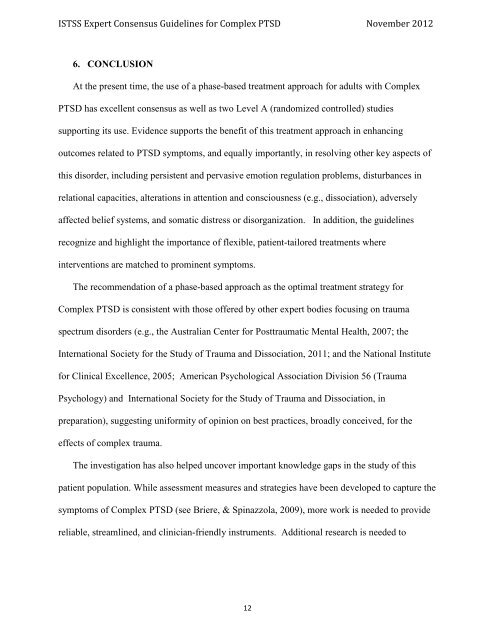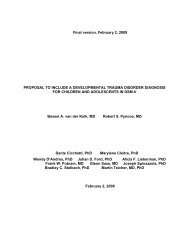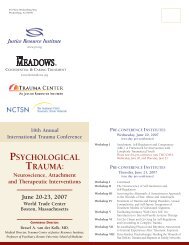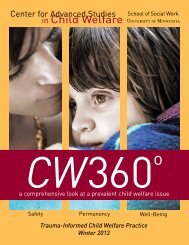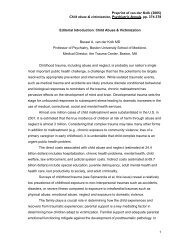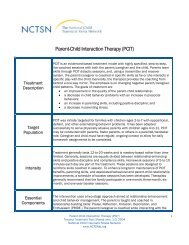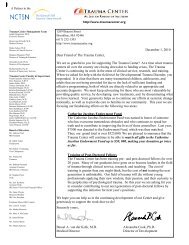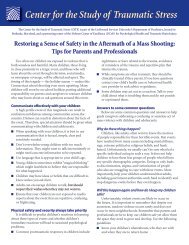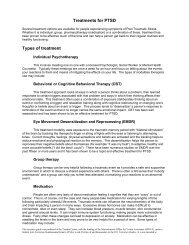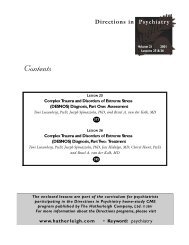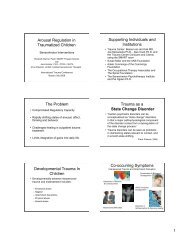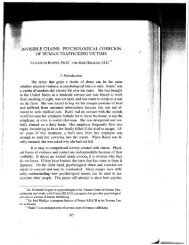ISTSS Expert Consensus Treatment Guidelines for Complex PTSD
ISTSS Expert Consensus Treatment Guidelines for Complex PTSD
ISTSS Expert Consensus Treatment Guidelines for Complex PTSD
You also want an ePaper? Increase the reach of your titles
YUMPU automatically turns print PDFs into web optimized ePapers that Google loves.
<strong>ISTSS</strong> <strong>Expert</strong> <strong>Consensus</strong> <strong>Guidelines</strong> <strong>for</strong> <strong>Complex</strong> <strong>PTSD</strong> November 2012<br />
6. CONCLUSION<br />
At the present time, the use of a phase-based treatment approach <strong>for</strong> adults with <strong>Complex</strong><br />
<strong>PTSD</strong> has excellent consensus as well as two Level A (randomized controlled) studies<br />
supporting its use. Evidence supports the benefit of this treatment approach in enhancing<br />
outcomes related to <strong>PTSD</strong> symptoms, and equally importantly, in resolving other key aspects of<br />
this disorder, including persistent and pervasive emotion regulation problems, disturbances in<br />
relational capacities, alterations in attention and consciousness (e.g., dissociation), adversely<br />
affected belief systems, and somatic distress or disorganization. In addition, the guidelines<br />
recognize and highlight the importance of flexible, patient-tailored treatments where<br />
interventions are matched to prominent symptoms.<br />
The recommendation of a phase-based approach as the optimal treatment strategy <strong>for</strong><br />
<strong>Complex</strong> <strong>PTSD</strong> is consistent with those offered by other expert bodies focusing on trauma<br />
spectrum disorders (e.g., the Australian Center <strong>for</strong> Posttraumatic Mental Health, 2007; the<br />
International Society <strong>for</strong> the Study of Trauma and Dissociation, 2011; and the National Institute<br />
<strong>for</strong> Clinical Excellence, 2005; American Psychological Association Division 56 (Trauma<br />
Psychology) and International Society <strong>for</strong> the Study of Trauma and Dissociation, in<br />
preparation), suggesting uni<strong>for</strong>mity of opinion on best practices, broadly conceived, <strong>for</strong> the<br />
effects of complex trauma.<br />
The investigation has also helped uncover important knowledge gaps in the study of this<br />
patient population. While assessment measures and strategies have been developed to capture the<br />
symptoms of <strong>Complex</strong> <strong>PTSD</strong> (see Briere, & Spinazzola, 2009), more work is needed to provide<br />
reliable, streamlined, and clinician-friendly instruments. Additional research is needed to<br />
12


